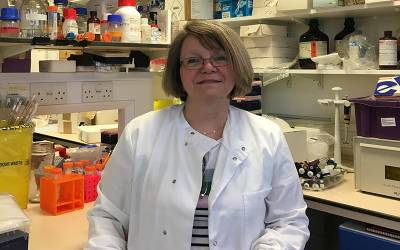Bailly Lab
My group uses a range of cellular models to study physiological and pathological cell behaviour regulated by cytoskeletal dynamics and mechano-regulatory pathways, particularly in the context of scarring and fibrosis. We focus on understanding the biology of fibroblasts, and how they sense and respond to mechanical and chemical clues in their environment. Our aim is to uncover how changes in fibroblasts biomechanical properties regulate tissue homeostasis in physiology and disease and to develop engineered tissue models to understand complex tissue biology and predict response to therapeutics. We work on a variety of ocular diseases including ocular fibrotic diseases such as trachoma and thyroid eye disease, glaucoma scarring, myopia, cancer, and inflammation.
- Research Projects
The lab's most recent interests broadly fall under two areas:
Molecular mechanisms and therapeutic approaches to fibroblast-mediated tissue contraction and scarring
Mechanical sensing is a fundamental process that regulates essential cellular features such as shape, motility, proliferation or differentiation. Deregulation of the tissue tensional homeostasis in stromal cells such as fibroblasts is at the basis of most stress-induced pathological remodelling, such as cardiac hypertrophy, fibrosis and scarring, but also underlies organ development and ocular pathologies such as myopia. We have demonstrated a direct involvement of changes in fibroblasts biomechanics in Floppy Eyelid Syndrome (Ezra et al, IOVS 2010), and shown that the MRTF/SRF mechanotransduction pathway is important in regulating post-surgical scarring in glaucoma (Yu-Wai-Man, Scientific Reports 2017). We have recently started to investigate the role of scleral fibroblast biomechanics in myopia, in collaboration with Dr Annegret Dahlmann-Noor at Moorfields Eye Hospital. We are particularly interested in how scleral fibroblasts are regulated during postnatal eye growth and how changes in their biomechanical properties may influence myopia development in children.
Tissue contraction and scarring processes play a part in the pathogenesis or failure of treatment of virtually every major blinding disease. Yet, very little is known about the molecular mechanisms involved. We have developed in vitro and ex vivo models that allow the study of tissue contraction mechanisms and fibroblast biomechanics within pseudo-physiological 3D “tissue-like” environments (Dahlmann-Noor et al, Exp. Cell Res 2006; Tovell et al, Archives of Ophthalmol. 2011; Li et al, IOVS 2013; LI et al, PLoS One 2014; Kechagia et al, Scientific Reports 2016, Kozdon et al. PLOS One 2020), and we identified novel targets and drugs for anti-scarring treatment, including the Rac1 small GTPase (Tovell et al. IOVS 2012), the MRTF/SRF pathway (Yu-Wai-Man et al, Scientific Reports 2017) and doxycycline (Li et al, IOVS 2013). We are currently developing biodegradable doxycycline-loaded microparticles as an anti-scarring treatment for postsurgical scarring in glaucoma and trachoma (in collaboration with Prof Richard Day at UCL), and investigating their mechanism of action. In parallel, we are exploring how inflammation (and particularly macrophages) promotes ocular fibrosis and how this process can be modulated to prevent post-surgical scarring.
Fibroblast mechanobiology and myopia
Mechanical sensing is a fundamental process that regulates essential cellular features such as shape, motility, proliferation or differentiation. Deregulation of the tissue tensional homeostasis in stromal cells such as fibroblasts is at the basis of most stress-induced pathological remodelling, such as cardiac hypertrophy, fibrosis and scarring, but also underlies organ development and ocular pathologies such as myopia. We have demonstrated a direct involvement of changes in fibroblasts biomechanics in Floppy Eyelid Syndrome (Ezra et al, IOVS 2010), and shown that the MRTF/SRF mechanotransduction pathway is important in regulating post-surgical scarring in glaucoma (Yu-Wai-Man, Scientific Reports 2017). We have recently started to investigate the role of scleral fibroblast biomechanics in myopia, in collaboration with Dr Annegret Dahlmann-Noor at Moorfields Eye Hospital. We are particularly interested in how scleral fibroblasts are regulated during postnatal eye growth and how changes in their biomechanical properties may influence myopia development in children.
- People
Professor Maryse Bailly

Email: m.bailly@ucl.ac.uk
Miss Yuyi Ren, PhD student
Miss Fiorella Alberini, PHD studentFind us
We are based at UCL Institute of Ophthalmology, 11-43 Bath Street London EC1V 9EL.
 Close
Close

